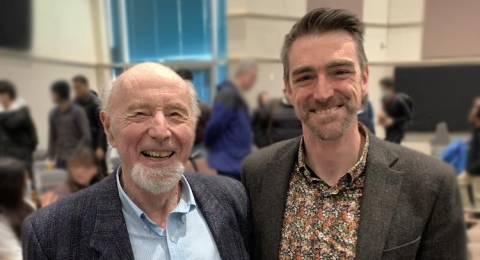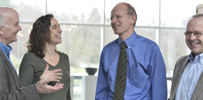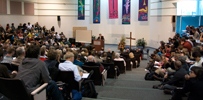A Conversation with Regent's New Stevens Chair, Dr. David Robinson

This month, Regent College welcomed Dr. David Robinson into his new role as R. Paul Stevens Assistant Professor of Marketplace Theology and Leadership. The Stevens Chair was endowed in 2019 as one of the first projects to be fully funded by Regent's Deep Roots Wide Reach Campaign. The College is deeply grateful to Dr. Margaret Wong, whose generous gift of $3.5 million created this professorship.
David comes to this position with a passion for helping students to discern their vocations and to work with excellence before God. He is an academic theologian with a background in campus and pastoral ministry. He also has significant experience in manual labour, respite work, communications consulting, and stay-at-home parenting.
David has held a number of roles at Regent College since 2017, including teaching and research in the area of theological ethics and co-leading Regent's Interface project, which equips students and ministry leaders to engage with science. As Stevens Chair, he will oversee Regent’s Marketplace Theology concentration and serve as Director of the Master of Arts in Leadership, Theology, and Society (MALTS) program.
In this interview, David shares his vision for marketplace theology at Regent College and beyond.
David, congratulations on your appointment to the Stevens Chair! Have you had a chance to get to know Paul Stevens?
I have! We had a wonderful lunch together a few days ago. We were recalling a course I took with him as a Regent student that was part of my own vocational discernment. We also talked about his long history of innovation in the area that we now call marketplace theology. It's delightful to see his ongoing joy in this work—I hope I can be like that in my 80s!
I'm glad to work in continuity with what Professor Stevens has built, and to collaborate with him as he continues to lead in this area. At the same time, he has been very empowering as I step into this role. I believe his words were, "Don’t try to fill my boots! Be yourself." I appreciate that encouragement, as I have great respect for his living legacy. It's an honour to have his name on the Chair.
How did you become interested in this role?
I've had a longstanding interest in theological ethics. How do we reason critically about our ways of life—including our social and political systems––in light of who God is? I admire the work of systematic theology, but I've always wanted to work more directly on the ethics of Christian life in a given context. That's why I wrote my first book on Dietrich Bonhoeffer.
How do theological ethics relate to the marketplace? Two mentors encouraged me that there's a significant opportunity for deeper thinking and engagement here. I found a similar idea in the work of John Knapp, who has written about how the church often fails businesspeople by simply affirming the goodness of work without addressing the ethical complexities and trade-offs businesspeople experience. I see an opportunity to bring my particular background to bear and say, all right, let's consider how a greater attention to ethics can help us understand how our work relates to God's work, and ultimately be more faithful and effective in the contexts to which God has called us.
How has your own professional background shaped your thinking about vocation and the marketplace?
I've already mentioned my background in theology and ethics, so I'll highlight a few additional experiences that have been important for me.
One thing I have in common with Paul Stevens is that we both worked in student and pastoral ministry. I worked for three years in a start-up ministry at the University of Ottawa. Those students were studying to be musicians, economists, engineers, all kinds of careers. I enjoyed supporting them as they discerned their vocations and then pursued excellence in those areas. At the same time, I was active in congregational ministry in our nation's capital. There, too, I was walking with people from a wide range of life circumstances who were trying to understand how to work as Christians in the world.
More recently, my experience with the Regent Interface project has been deeply formative. Working with scientists who embody integration between their scientific work and their Christian faith got me excited about marketplace theology in a new way. Engagement with science is critical for the modern marketplace, as the past two years have shown. It also provides great opportunities to engage with people at UBC, which I think is vital given Regent’s mission and location.
I've also worked a number of other jobs, including manual labour and respite work. That gives me a sense for the variety of roles people occupy, as well as a better understanding of those who don't have a single, linear career trajectory.
If you were talking to someone who had never heard of marketplace theology, how would you explain it to them?
So, this is a working definition—I want to continue developing this area with others. But here's my starting point: marketplace theology engages in public reasoning about business, labour, and the professions in light of God's works.
I like to think about "public reasoning" in light of Acts 17. There we see Paul, the bi-vocational apostle, go to the market in Athens and end up giving a speech to a group of philosophers. Here's a great example of a marketplace theologian who gets a hearing from people who are thinking seriously about what it means to live well. He's able to talk about God in a way that makes sense to them, and he's able to be really compelling.
Paul Stevens has described marketplace theology as the integration of faith with work in the world. I like that a lot. I also want to emphasize that by "work," we mean "business, labour, and the professions." Contemporary marketplace theology is usually very interested in business, and that will certainly continue as I teach it. But we don't often see labour or the professions included to the same extent. I'd like to see our understanding expand to encompass these areas.
In a similar vein, how would you define leadership?
Leadership, I would say, is taking initiative to build with others.
There's a term I love in the New Testament: "to edify," which means "to build up." This is the domain of leadership. It isn't just maintaining or reacting to the status quo. Leaders take initiative to ask what might be possible; then they build. It's easy to criticize or take a side, but building something—an institution, a company, a nation, a family—is much harder. It's also far more rewarding.
I specify building with others in order to acknowledge that leaders are formed—as people and as leaders—in communities. It's also a reminder that while some people in an institution are singled out as leaders, those leaders are most effective when they work collaboratively with others.
I think that this definition holds true for C-suite executives, but it isn't limited to people who hold formal offices of leadership. For example, I want my definition of leadership to work for homemakers. I've been one for a time, and that is leadership too!
For someone who does have a formal office of leadership, what does marketplace theology offer that they might not find elsewhere?
It can be very helpful and important to be vested with power, but leadership offices don't automatically confer relational wisdom or moral authority. At Regent, we want to support people who have these positions but whose training hasn't equipped them to "work out" their faith, to develop and preserve moral authority, or to access rich wisdom traditions that can speak to their experience. These are things Regent can provide for people in high-pressure, often very isolating positions.
How does marketplace theology speak to the situations of those who don't have power—including those who may have very little choice in the work they do to survive?
This is an absolutely crucial question. I have a lot to learn in this area, but I'll make two observations.
First, those whose choices are limited, including those experiencing social, political, or economic oppression, are under serious constraints. There is real alienation in many workplaces. Such people are not likely to be edified by discussions that focus on personal fulfillment or the idea that God provides an exact match between desire and opportunity.
So it's critical that we first ask, how do people in disempowering situations see themselves? How do they understand God's calling on their lives? Someone who's doing important work in this area is my colleague Gustavo H. R. Santos, a Regent grad who has served as MALTS Program Manager for several years. Gustavo's doctoral work focuses on the lived experience of Brazilian domestic workers against a background of enslavement. I look forward to learning more from him, and from the workers he'll be interviewing.
Second, those of us who have a lot of choices as consumers need to think about how our decisions can inadvertently deprive others of power. The marketplace is not only about the work we do; it's also about the work we pay for. We can get so stuck thinking about lower prices or faster delivery times that we don't consider the costs to workers and to our social fabric. How do our often unreflective choices as consumers affect the work—and working conditions—of others? Can we spend in ways that are more empowering to others, even if that means reworking our budgets?
We've seen huge shifts in how society thinks about work over the past few years. What do you see as the role of marketplace theology at this moment in history?
It's hard to think of a more important time for marketplace theology. The Economist called 2022 "the year of the worker." It's a good time for workers, in many ways—that's why we've seen "the great resignation." Many workers have more bargaining power, so they're getting a chance to conceive of their lives differently and rethink the positions they're in. People are reconsidering their vocations, and we want to equip them for that.
Here are three tasks I see for marketplace theology in this year of the worker. First, to refresh people with the truth of God's creative work in the world. Second, to provide workers with resources for spiritual discernment on both individual and institutional levels. Third, to guide people to reason critically and think holistically about the ethics of work.
Finally, I want to think about how marketplace theology can speak to the experience of unemployment. We've seen huge volatility in job markets recently, and that makes it especially important to think about the experience of those who have been "made redundant." When we experience unemployment, what's our sense of identity in God? What provides our point of connection to society and to the church? I've had to wrestle with these questions in my own life, and I think marketplace theology can do more to speak into this area.
What are you most looking forward to as you step into this new position, and what are you hoping to learn?
I'm excited about to the opportunity to innovate. When I was first thinking about coming to Regent as a student, the academic catalogue had one word on the front cover: "distinctive." I like that about Regent. I think there will be great scope for creativity as we discern God's leadership in the years ahead.
In terms of what I want to learn, I'm fascinated by the unique, irreducible experiences of Christians in the marketplace. What brings them joy in their work? What keeps them up at night? Where have they seen God at work? There's so much to learn from Christians who are doing faithful work. I can accompany, encourage, and equip students, but they're the ones working out their theology on the ground. The Spirit will be at work in them, and they'll have truth to speak to me and to each other. I'm excited to see what we'll discover together.
If you'd like to hear more from David, tune in to his discussion of "God’s Providence, Geopolitics, and Prayer" in the March 4, 2022, episode of the Regent College Podcast.




